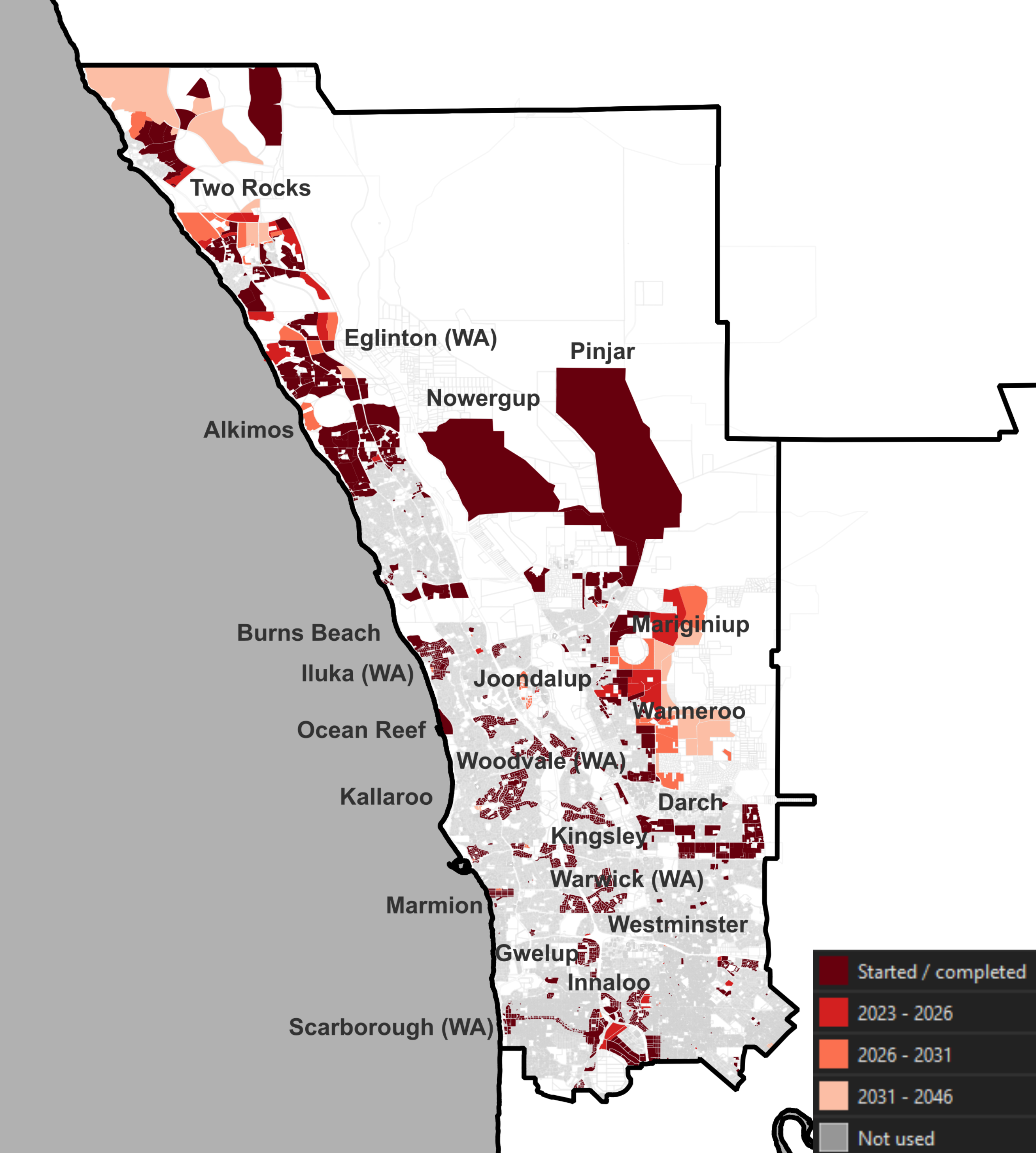The population and housing forecast for the Perth - North West region
Read forecast analysis and insights for the Perth - North West region from Australia's largest independent population forecasting team.
Detailed forecasts are available for this region
Our premium services give you detailed forecast information for this region to help you invest in the right place, at the right time.
- Forecasts by age and sex
- Single-year forecast periods
- Custom local area geography
- Forecasts of housing and development
Menu
Read the insights and analysis behind our population and dwellings forecasts for the Perth - North West region.
Key findings
A diverse region, set to experience significant growth
The Perth - North West region is expected to grow strongly from 2021 to 2046. This growth will mostly be concentrated in the Northern Growth areas of the City of Wanneroo, which has experienced substantial population growth since the early 2000s, incorporating many parts of the City into the contiguous urban area of Perth. The City of Wanneroo has been the primary focus for residential development in the northern suburbs of Perth, and this will continue throughout the forecast period. Butler is the most recent suburb to approach completion, and development continues to the north of that locality. The major growth precincts in the short to medium term include newly developing housing estates in Alkimos, Eglinton and Yanchep. It is expected that development in Alkimos, Eglinton and Yanchep will be exhausted before the end of the forecast, with Two Rocks becoming the major growth precinct in the latter half of the forecast period. Given the high level of demand forecast over the period, it is likely that Two Rocks will be substantially developed by 2046, with a total of 27,500 dwellings by 2046, with a remaining 6,600 capacity.
With pressure on the Northern Coastal Growth Corridor, a further development front is expected to open in East Wanneroo and commence delivering housing from 2028. This is governed by the East Wanneroo District Structure Plan and includes the localities of Wanneroo, Mariginiup, Gnangara, Jandabup and Pinjar. Collectively, it is expected that this area will see development of 17,500 homes to 2046.
It is also expected that the southern area in City of Stirling will see significant densification, owing to the redevelopment of lower density housing into smaller units and apartments close to transport routes and around commercial centres, together with the redevelopment of redundant industrial land in the Osbourne Park Industrial area. Additionally, higher density precincts close to the beach in Scarborough also provide opportunities.
In contrast, the City of Joondalup, having been predominantly developed through the late 1980s and 1990s, has fewer development opportunities over the period. The largest opportunities being the Ocean Reef Marina Estate in Burns Beach and densification around the Joondalup city centre.
Overall, the region is forecast to add 263,968 people in the period 2021-2046, growing by 44%.
In the base year of 2021, Butler - Merriwa – Ridgewood, Karrinyup - Gwelup - Carine and Balga – Mirrabooka were the most populous SA2s in the region. By 2046, growth in new housing estates sees Two Rocks, Alkimos – Eglinton, Tapping - Ashby - Sinagra and Hocking - Pearsall being the most populous areas. Although the growth areas dominate the list of most populous suburbs by 2046, higher density areas such as Innaloo – Doubleview, Stirling - Osborne Park and Osborne Park Industrial area are also expected to experience significant population growth driven by apartment and medium density development. Osbourne Park Industrial area in particular is expected to grow from approximately 200 persons in 2021 to 5,145 persons by 2046.
In terms of overall growth, the most northerly locality of Two Rocks is forecast to experience the highest amount of population growth by 2046 (71,200 persons). This is driven by new residential expansion which gains pace later in the forecast period as the areas to its south exhaust available land supplies.
Many established areas are expected to experience a relatively stable population over the forecast period. This includes areas in the northern parts of the City of Stirling and in City of Joondalup, as well as areas more remote from major transport infrastructure.
What share of Australia's growth will occur in Perth - North West?
Read our forecast results and analysis for Western Australia to learn more about how the different drivers of population change affect the distribution of growth throughout the state.
Forecast results
The following forecast information is for the entire Perth - North West region.
Learn more about the different options to access these forecasts for Local Government Areas (LGAs), suburbs, custom catchments or the entire state or nation here.
| 2026 | 2031 | 2036 | 2041 | 2046 | |
|---|---|---|---|---|---|
Forecast population |
650,320 |
702,262 |
754,674 |
807,820 |
861,054 |
Change (five year) |
53,234 |
51,942 |
52,412 |
53,146 |
53,234 |
Average annual change (%) |
1.7% |
1.5% |
1.4% |
1.4% |
1.3% |
Forecast dwellings |
239,841 |
260,475 |
281,144 |
301,996 |
325,236 |
Change (five year) |
11,067 |
20,634 |
20,669 |
20,852 |
23,240 |
Average annual change (%) |
0.9% |
1.7% |
1.5% |
1.4% |
1.5% |
Map of development sites
The map below identifies all major development sites that have been identified in our research.
These sites have been organised to understand the likely location, capacity, timing and sequence of future development. By matching forecast population growth in this area to these sites, we can provide a more granular view of the distribution of the forecast population within a given region.
In the Perth - North West region, we identified 525 development sites. 75% of these sites' dwelling capacity was used in the forecast period.
Learn more about our land use research →

1 national forecasting program.
6 ways to explore.
![]()
forecast.id
Plan for the changing needs of your community with a trusted forecast of population and housing in your Local Government Area, published in an accessible online tool.
![]()
forecast.id premium
Bring the full power of our National Forecasting Program into your organisation. We'll work with you to tailor a data partnership supported by briefings from our experts.
![]()
forecast.id partners
Our pay-per-download program gives our consulting partners instant access to reliable and respected forecast information on a project-by-project basis.
![]()
forecast.id hotspot report
Find a location near the people you serve with a tailored report that identifies up to ten locations with the highest number of people in your target demographic.
![]()
forecast.id location report
Whether you're investing in a new location or checking your current strategy is on track, forecast.id location reports quantify future demand around a known location.






.png?width=600&height=400&name=Meet%20the%20team%20%20Oliver%20Bowering%20(1).png)
